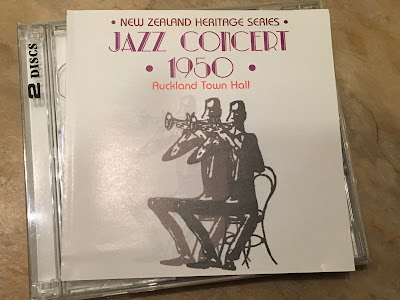Maybe
inspired by giving the Jimmy Giuffre 3 a or three spin a
couple of weekends ago, last week I decided to revisit more music I
hadn't listened to for a long time.
As
an aspiring jazz musician it's pretty hard to pass by these
recordings, and I definitely spent a fair amount of time with
Cookin', Relaxin', Workin' and Steamin' –
and of those I'm probably most familiar with Relaxin.' Over
the years there's been the odd track here and there, but it's been a
while that I've sit down and listened to them from start to finish.
This set also includes The New Miles Davis Quintet (that I'm
less familiar with) and a disc of live material (that is new to me
but I only gave it a single run this week).
Phrasing,
time feel, space, economy, conciseness, continuity – Miles' playing
has an immediacy I find hard to resist. The way he plays the melody
on “Diane” (love the sound of Philly Joe 's cymbal behind Miles),
his solo break on “Surrey with the Fringe on Top,” the bubbly
feel of his longer lines on “Oleo” (PC is totally on here
too), the swinging simplicity of “Trane's Blues” and this open
horn tone on “Woody'n You.” Sometimes I feel Miles overdoes the
harmon mute. Aside from his great tone on the open horn it would have
been nice to hear him use other style mutes. But this could be one of
the disadvantages of listening to a box set I guess.
As
before, I'm not really struck by Coltrane's playing on these
recordings. Dare I say that, on the earlier tracks at least, in
comparison to Miles, he sounds labored (things pick up a bit on
“Four” and “Salt Peanuts” “Airegin”). Although, as
usually happens when I listen to Coltrane, I warm a little to his
playing throughout the week. But for me, it still misses the mark.
And how about his blend with Miles on the head of “Stablemates”?...
the intonation gives the piece an interesting vibe. But Coltrane is
the foil to Miles, and the contrast is part of what makes Miles'
playing so effective. Would it work as well if it was a trio with P.C
and Philly Joe? (Actually I think it would.... why didn't they do
that?!)
Garland
has his moments “Oleo” sounds like he's channeling Lennie
Tristano (there are hints on “Well You Needn't” too). And his
playing (comping and solo) on “Surrey with the Fringe on Top” is
on point. I didn't remember Garland's chord solos - “There Is No
Greater Love”, “Something I Dreamed Of Last Night” and “When
Lights Are Low” - and in general, I preferred them to his line
playing. So while he never really grabbed me as a soloist, his
comping is an important component of the overall band sound and he
locks in well with Chambers and Jones.
In
general, during the piano and tenor solos I found my concentration
moving towards the bass and drums. This week has been a reminder of
how much I enjoy Philly Joe's playing (had I forgotten....?)
Philly
Joe's tone enjoying it more than I remembered – the variety he gets
from the cymbals and snare, and a nice deep brush sound too. And then
there's the effortless flow and pop of Chambers' walking lines –
they just go and go and go.
As
with the Giuffre disc, I've enjoyed revisiting these recordings, and across the
week it reinforced some of my earlier memories of this music. Much
like before, my ear was drawn to the playing of Miles and the
combination of Chambers and Philly Joe. For me, these recordings
aren't ones I reach for to hear my favourite soloists (Miles being
the exception), but it's the overall band sound of these recordings
that hit the spot.



